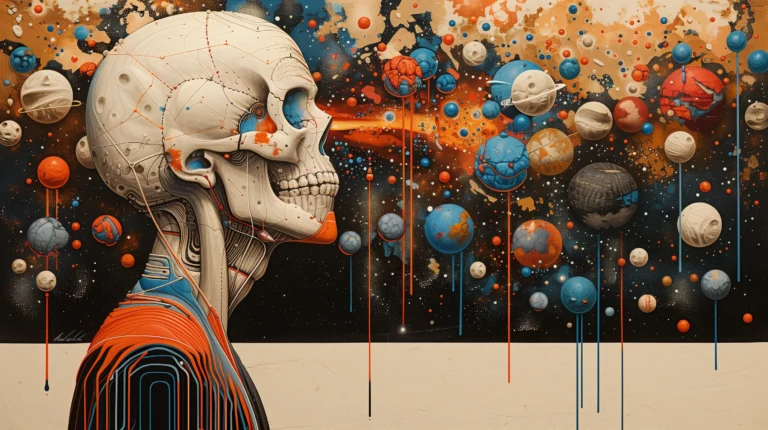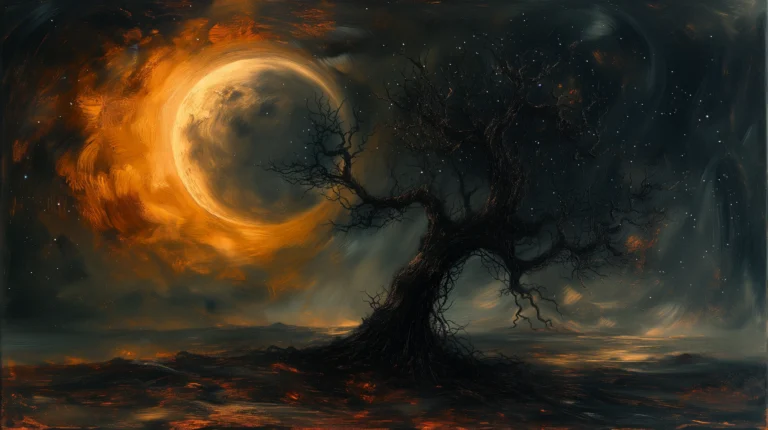The Divine Spectrum
Across epochs, civilizations, and cultures, humanity has perennially grappled with one central enigma: the nature of the Divine. Is God a benevolent, personal figure watching over us, or an omnipresent cosmic force that permeates everything? Or, perhaps, is the Divine something even beyond these categorizations, residing in the vast, uncharted territories of the ineffable?
This exposition embarks on a journey to explore the concepts of a Personal God and an Impersonal God, only to venture further into the idea that God might transcend all these notions. Join us as we delve deep into the spiritual and philosophical realms, seeking to unravel the layers of understanding that surround the greatest mystery of all.
Personal and Impersonal Concepts of God
The concept of the divine or the supreme being varies across cultures, religions, and philosophical traditions. One of the key distinctions in understanding these variations is the differentiation between a ‘Personal God’ and an ‘Impersonal God’. Let’s delve into these two conceptions to gain a better understanding.
1. Personal God:
A Personal God refers to a deity that has a distinct personality, similar to human beings, but without our limitations. This god can have emotions, intentions, desires, and can be in a relationship with its creations. The belief in a personal God is often rooted in the idea that God is someone you can have a personal relationship with, pray to, and receive guidance from. Let’s look at the characteristics of the personal God.
- Individual Personality: This God possesses qualities like love, anger, compassion, etc.
- Interactive: Believers can communicate, pray, and establish a relationship with this God.
- Anthropomorphic Attributes: Often depicted in human form or with human-like characteristics.
- Moral Judge: Holds beings accountable for their actions and rewards or punishes them.
- Examples: Yahweh in Judaism, God in Christianity, Allah in Islam, Vishnu and Shiva in Hinduism are all considered personal gods.
2. Impersonal God:
An Impersonal God, on the other hand, is not seen as a being with emotions or intentions. Instead, this concept of God is more abstract. It’s an all-encompassing energy or force that’s beyond human comprehension. An impersonal God doesn’t interact with the world in the way a personal God might, but rather exists as the underlying essence or principle of everything. Let’s look at the characteristics of the impersonal God.
- Beyond Human Attributes: Doesn’t possess human-like emotions or intentions.
- Universal Principle: Seen as the underlying essence or energy that permeates everything.
- Not Individualized: Doesn’t have individual consciousness, but rather is a universal consciousness.
- Beyond Judgment: Doesn’t reward or punish but may operate on principles like karma.
- Examples: Brahman in Hinduism, the Dao in Daoism, and the concept of the ‘Ground of Being’ in some philosophical contexts.
Comparative Analysis:
Before we venture further into the esoteric realms of divinity, it’s crucial to establish a foundational understanding of the two main paradigms often discussed in religious and philosophical contexts: the Personal God and the Impersonal God. These two frameworks offer distinct perspectives on our relationship with the Divine, the practices involved, and even the concept of salvation. Let’s examine these differences in more detail:
Nature of Relationship: With a Personal God, believers usually maintain a devotional or interactive relationship, seeking protection, guidance, and blessings. With an Impersonal God, the relationship is more about realization, meditation, and understanding the oneness with the universe.
Religious Practices: Worship of a Personal God often involves rituals, prayers, and religious ceremonies. On the other hand, understanding an Impersonal God might involve meditation, philosophical inquiries, and self-realization exercises.
Concept of Salvation: In religions with a Personal God, salvation or liberation often comes from grace, mercy, or following certain codes of conduct. In contrast, traditions that focus on an Impersonal God may view salvation as self-realization or understanding one’s true nature.
Beyond Personal and Impersonal
Having understood the distinctions between a Personal and an Impersonal God, it is crucial to explore an even more profound idea: that God, or the Divine Essence, might be beyond any categorizations or descriptions we attempt to attribute.
The Limitations of Language and Thought:
Human cognition and language are tools that have evolved over time to help us navigate our environment, communicate, and make sense of the world around us. However, when it comes to understanding and describing the infinite, these tools might not suffice. How can finite words and concepts capture the essence of the infinite?
When we ponder the ineffable realm of the Divine, we soon confront the stark limitations inherent in human language and cognition. As the renowned Swiss psychiatrist Carl Jung aptly put it,
“The word ‘God’ is for me nothing more than the expression and product of human weaknesses, the Bible a collection of honorable, but still primitive legends which are nevertheless pretty childish.”
His assertion highlights the complexity of encapsulating something as vast and indefinable as God within the restricted confines of human understanding.
Human cognition has evolved primarily as a survival tool, enabling us to categorize, analyze, and interpret the observable world. Our languages are extensions of this cognitive framework, designed to facilitate communication and share our collective knowledge and experiences.
However, the question arises: can these finite instruments of comprehension genuinely grasp the infinite nuances of divinity? As Ludwig Wittgenstein, the philosopher, noted,
“The limits of my language mean the limits of my world.”
The Wisdom of Ancient Traditions:
Various religious and philosophical doctrines have long recognized the inadequacy of human expression in capturing the essence of the Divine.
Ineffable in Judaism: In the Judaic tradition, the name of God, often represented by the tetragrammaton YHWH, is deemed so sacred that it is never pronounced. This practice underlines the foundational belief that God’s nature transcends human articulation. As Rabbi Abraham Joshua Heschel said,
“Words of worship must come forth in wonder, expressing an endless marveling over the inexhaustibility of the Divine.”
The ‘Neti-Neti’ of Buddhism: In Buddhist thought, the principle of ‘neti-neti’—a Sanskrit phrase meaning “not this, not that”—plays a pivotal role. This notion suggests that the Ultimate Reality, or Nirvana, is beyond any descriptions or categorizations. Describing it would be a paradox, akin to trying to catch air in a net. As the Zen saying goes,
“The Tao that can be told is not the eternal Tao; the name that can be named is not the eternal name.”
The Paradoxical Poetics of Sufism: Sufism, the mystical Islamic tradition, often employs poetic and paradoxical expressions to intimate the experience of the Divine. It acknowledges the ineffability of God by using symbolism, metaphor, and allegory, capturing the unsayable in lyrical beauty. The great Sufi poet Rumi once declared,
“Words cannot describe the condition that comes upon me when I am illumined with the light of the face of the Beloved.”
In conclusion, the quest to define or understand God poses a formidable challenge to the limitations of human cognition and language. Recognizing these limitations doesn’t diminish our spiritual pursuits but enriches them, encouraging us to seek alternative pathways of understanding, such as direct experience, mysticism, or even the humble acceptance of the great Mystery that the Divine ultimately is.
Embracing the Mystery:
While the concepts of a Personal and Impersonal God provide frameworks for understanding and relating to the Divine, they are not definitive. They are more like fingers pointing to the moon, not the moon itself. The true nature of God might be an amalgamation of both these ideas, neither of them, or beyond them entirely.
Embracing this mystery can be both humbling and enlightening. It reminds us of the vastness of the unknown and encourages a continuous exploration of our spiritual journey. Instead of becoming rigid in one belief system, one can remain open to various experiences and insights, recognizing that they are all parts of a larger, unfathomable whole.
Personal Experience over Dogma:
Ultimately, the nature of God is a deeply personal and experiential matter. While scriptures, teachings, and philosophies can guide us, our understanding often evolves through personal experiences, contemplation, and insights. Many spiritual seekers and mystics have reported experiences that don’t fit neatly into any categories or descriptions. They often resort to metaphors, poetry, and art to express the inexpressible.
Concluding Thoughts
The concept of God, in its myriad interpretations, has long been a cornerstone of human contemplation and spirituality. From the tangible, emotive descriptions of a Personal God to the abstract, boundless depictions of an Impersonal God, and even beyond these categorizations, the Divine remains an enigma, deeply personal and yet universally sought.
The famous theologian Paul Tillich once said,
“God does not exist. He is being itself beyond essence and existence.”
This quote encapsulates the ineffable nature of the Divine, suggesting that our attempts to define or understand God through conventional means or language might always fall short. Similarly, the ancient Hindu scriptures expound on the idea of ‘neti-neti’ (not this, not that), reminding seekers that any conceptualization of the Divine is but a mere approximation.
However, it is in this very exploration — a dance between knowing and unknowing — that many find profound spiritual growth. As Rumi, the celebrated Sufi poet, beautifully expressed,
“Silence is the language of God; all else is poor translation.”
Our narratives, whether of a Personal or Impersonal God, are attempts to translate this cosmic silence into something comprehensible, something relatable.
But, perhaps the true essence of God, as many mystics and philosophers suggest, lies in the journey itself, in the continuous quest for understanding, in the moments of doubt, in the epiphanies, and in the silent meditations.
It’s a journey that celebrates not just the destination, but the path, the questions, the challenges, and the insights. As Saint Augustine wisely observed,
“If you comprehend it, it is not God.”
Thus, while we navigate the vast expanse of spiritual thought, it is vital to remain open, humble, and curious, recognizing that the Divine, in its infinite wisdom, might always remain a beautiful mystery, forever inviting, forever elusive. As stated in the Qur’an,
“Vision perceives Him not, but He perceives [all] vision; and He is the Subtle, the Acquainted” (Qur’an 6:103).
The Symphony of the Unknown
Let’s listen to a beautiful poem. May this poem serve as a gentle reminder that sometimes, it is in the embrace of the unknown that we find the most profound peace and understanding. The Divine, in all its forms and beyond them, will forever be the greatest mystery, beckoning us to continue our eternal quest for truth and meaning.
In the labyrinth of questions, where answers seldom roam,
Through sacred texts and sermons, we seek to find a home.
Yet deep within the silence, beyond the spoken word,
Lies the ineffable secret, seldom seen, seldom heard.
Do we look for a Father, with love both kind and stern?
Or an all-encompassing Force, in which we discern
The dance of galaxies, the song of cosmic grace—
That we are but stardust, in this boundless, breathing space.
So we quest for connection, in temples made by man,
With rituals and doctrines, with every sacred plan.
Yet sometimes in a whisper, or in a fleeting glance,
We find the ever-patient Divine, waiting for its chance.
Here, in the realm of mystery, where knowledge meets its end,
A canvas painted with the hues of faith, where shadows blend.
We may not grasp the Infinite, or name it in our creed,
But feel it in the heartbeat of every selfless deed.
And so, as we wander through this labyrinth of dreams,
Where nothing is just simple as the human psyche deems,
Let’s dwell not just on answers, but on each and every quest—
For in the Symphony of the Unknown, our souls find true rest.







